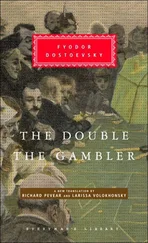Fyodor Dostoevsky - The Complete Novels of Fyodor Dostoyevsky
Здесь есть возможность читать онлайн «Fyodor Dostoevsky - The Complete Novels of Fyodor Dostoyevsky» — ознакомительный отрывок электронной книги совершенно бесплатно, а после прочтения отрывка купить полную версию. В некоторых случаях можно слушать аудио, скачать через торрент в формате fb2 и присутствует краткое содержание. Жанр: unrecognised, на английском языке. Описание произведения, (предисловие) а так же отзывы посетителей доступны на портале библиотеки ЛибКат.
- Название:The Complete Novels of Fyodor Dostoyevsky
- Автор:
- Жанр:
- Год:неизвестен
- ISBN:нет данных
- Рейтинг книги:5 / 5. Голосов: 1
-
Избранное:Добавить в избранное
- Отзывы:
-
Ваша оценка:
- 100
- 1
- 2
- 3
- 4
- 5
The Complete Novels of Fyodor Dostoyevsky: краткое содержание, описание и аннотация
Предлагаем к чтению аннотацию, описание, краткое содержание или предисловие (зависит от того, что написал сам автор книги «The Complete Novels of Fyodor Dostoyevsky»). Если вы не нашли необходимую информацию о книге — напишите в комментариях, мы постараемся отыскать её.
Poor Folk
The Double
Notes From The Underground
Crime and Punishment
The Gambler
The Idiot
The Possessed (The Devils)
A Raw Youth
The Dream of a Ridiculous Man
The Brothers Karamazov
The Complete Novels of Fyodor Dostoyevsky — читать онлайн ознакомительный отрывок
Ниже представлен текст книги, разбитый по страницам. Система сохранения места последней прочитанной страницы, позволяет с удобством читать онлайн бесплатно книгу «The Complete Novels of Fyodor Dostoyevsky», без необходимости каждый раз заново искать на чём Вы остановились. Поставьте закладку, и сможете в любой момент перейти на страницу, на которой закончили чтение.
Интервал:
Закладка:
BARBARA DOBROSELOVA.
MY DEAREST BARBARA ALEXIEVNA,—To think that a day like this should have fallen to my miserable lot! Surely you are making fun of an old man? … However, it was my own fault—my own fault entirely. One ought not to grow old holding a lock of Cupid's hair in one's hand. Naturally one is misunderstood… . Yet man is sometimes a very strange being. By all the Saints, he will talk of doing things, yet leave them undone, and remain looking the kind of fool from whom may the Lord preserve us! … Nay, I am not angry, my beloved; I am only vexed to think that I should have written to you in such stupid, flowery phraseology. Today I went hopping and skipping to the office, for my heart was under your influence, and my soul was keeping holiday, as it were. Yes, everything seemed to be going well with me. Then I betook myself to my work. But with what result? I gazed around at the old familiar objects, at the old familiar grey and gloomy objects. They looked just the same as before. Yet WERE those the same inkstains, the same tables and chairs, that I had hitherto known? Yes, they WERE the same, exactly the same; so why should I have gone off riding on Pegasus' back? Whence had that mood arisen? It had arisen from the fact that a certain sun had beamed upon me, and turned the sky to blue. But why so? Why is it, sometimes, that sweet odours seem to be blowing through a courtyard where nothing of the sort can be? They must be born of my foolish fancy, for a man may stray so far into sentiment as to forget his immediate surroundings, and to give way to the superfluity of fond ardour with which his heart is charged. On the other hand, as I walked home from the office at nightfall my feet seemed to lag, and my head to be aching. Also, a cold wind seemed to be blowing down my back (enraptured with the spring, I had gone out clad only in a thin overcoat). Yet you have misunderstood my sentiments, dearest. They are altogether different to what you suppose. It is a purely paternal feeling that I have for you. I stand towards you in the position of a relative who is bound to watch over your lonely orphanhood. This I say in all sincerity, and with a single purpose, as any kinsman might do. For, after all, I AM a distant kinsman of yours—the seventh drop of water in the pudding, as the proverb has it—yet still a kinsman, and at the present time your nearest relative and protector, seeing that where you had the right to look for help and protection, you found only treachery and insult. As for poetry, I may say that I consider it unbecoming for a man of my years to devote his faculties to the making of verses. Poetry is rubbish. Even boys at school ought to be whipped for writing it.
Why do you write thus about "comfort" and "peace" and the rest? I am not a fastidious man, nor one who requires much. Never in my life have I been so comfortable as now. Why, then, should I complain in my old age? I have enough to eat, I am well dressed and booted. Also, I have my diversions. You see, I am not of noble blood. My father himself was not a gentleman; he and his family had to live even more plainly than I do. Nor am I a milksop. Nevertheless, to speak frankly, I do not like my present abode so much as I used to like my old one. Somehow the latter seemed more cosy, dearest. Of course, this room is a good one enough; in fact, in SOME respects it is the more cheerful and interesting of the two. I have nothing to say against it—no. Yet I miss the room that used to be so familiar to me. Old lodgers like myself soon grow as attached to our chattels as to a kinsman. My old room was such a snug little place! True, its walls resembled those of any other room—I am not speaking of that; the point is that the recollection of them seems to haunt my mind with sadness. Curious that recollections should be so mournful! Even what in that room used to vex me and inconvenience me now looms in a purified light, and figures in my imagination as a thing to be desired. We used to live there so quietly—I and an old landlady who is now dead. How my heart aches to remember her, for she was a good woman, and never overcharged for her rooms. Her whole time was spent in making patchwork quilts with knitting-needles that were an arshin [An ell.] long. Oftentimes we shared the same candle and board. Also she had a granddaughter, Masha—a girl who was then a mere baby, but must now be a girl of thirteen. This little piece of mischief, how she used to make us laugh the day long! We lived together, a happy family of three. Often of a long winter's evening we would first have tea at the big round table, and then betake ourselves to our work; the while that, to amuse the child and to keep her out of mischief, the old lady would set herself to tell stories. What stories they were!—though stories less suitable for a child than for a grown-up, educated person. My word! Why, I myself have sat listening to them, as I smoked my pipe, until I have forgotten about work altogether. And then, as the story grew grimmer, the little child, our little bag of mischief, would grow thoughtful in proportion, and clasp her rosy cheeks in her tiny hands, and, hiding her face, press closer to the old landlady. Ah, how I loved to see her at those moments! As one gazed at her one would fail to notice how the candle was flickering, or how the storm was swishing the snow about the courtyard. Yes, that was a goodly life, my Barbara, and we lived it for nearly twenty years… . How my tongue does carry me away! Maybe the subject does not interest you, and I myself find it a not over-easy subject to recall—especially at the present time.
Darkness is falling, and Theresa is busying herself with something or another. My head and my back are aching, and even my thoughts seem to be in pain, so strangely do they occur. Yes, my heart is sad today, Barbara… . What is it you have written to me? —"Why do you not come in PERSON to see me?" Dear one, what would people say? I should have but to cross the courtyard for people to begin noticing us, and asking themselves questions. Gossip and scandal would arise, and there would be read into the affair quite another meaning than the real one. No, little angel, it were better that I should see you tomorrow at Vespers. That will be the better plan, and less hurtful to us both. Nor must you chide me, beloved, because I have written you a letter like this (reading it through, I see it to be all odds and ends); for I am an old man now, dear Barbara, and an uneducated one. Little learning had I in my youth, and things refuse to fix themselves in my brain when I try to learn them anew. No, I am not skilled in letter-writing, Barbara, and, without being told so, or any one laughing at me for it, I know that, whenever I try to describe anything with more than ordinary distinctness, I fall into the mistake of talking sheer rubbish… . I saw you at your window today—yes, I saw you as you were drawing down the blind! Good-bye, goodbye, little Barbara, and may God keep you! Good-bye, my own Barbara Alexievna!—Your sincere friend,
MAKAR DIEVUSHKIN.
P.S.—Do not think that I could write to you in a satirical vein, for I am too old to show my teeth to no purpose, and people would laugh at me, and quote our Russian proverb: "Who diggeth a pit for another one, the same shall fall into it himself."
April 9th
MY DEAREST MAKAR ALEXIEVITCH,—Are not you, my friend and benefactor, just a little ashamed to repine and give way to such despondency? And surely you are not offended with me? Ah! Though often thoughtless in my speech, I never should have imagined that you would take my words as a jest at your expense. Rest assured that NEVER should I make sport of your years or of your character. Only my own levity is at fault; still more, the fact that I am so weary of life.
What will such a feeling not engender? To tell you the truth, I had supposed that YOU were jesting in your letter; wherefore, my heart was feeling heavy at the thought that you could feel so displeased with me. Kind comrade and helper, you will be doing me an injustice if for a single moment you ever suspect that I am lacking in feeling or in gratitude towards you. My heart, believe me, is able to appraise at its true worth all that you have done for me by protecting me from my enemies, and from hatred and persecution. Never shall I cease to pray to God for you; and, should my prayers ever reach Him and be received of Heaven, then assuredly fortune will smile upon you!
Читать дальшеИнтервал:
Закладка:
Похожие книги на «The Complete Novels of Fyodor Dostoyevsky»
Представляем Вашему вниманию похожие книги на «The Complete Novels of Fyodor Dostoyevsky» списком для выбора. Мы отобрали схожую по названию и смыслу литературу в надежде предоставить читателям больше вариантов отыскать новые, интересные, ещё непрочитанные произведения.
Обсуждение, отзывы о книге «The Complete Novels of Fyodor Dostoyevsky» и просто собственные мнения читателей. Оставьте ваши комментарии, напишите, что Вы думаете о произведении, его смысле или главных героях. Укажите что конкретно понравилось, а что нет, и почему Вы так считаете.












